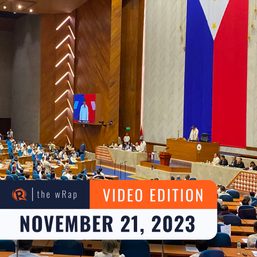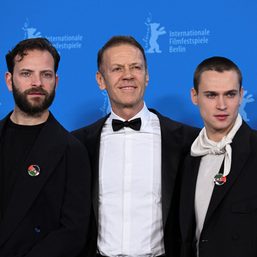SUMMARY
This is AI generated summarization, which may have errors. For context, always refer to the full article.
 In this day of rising teenage pregnancies, HIV infections, and risky sexual behaviors among young people, it makes sense for schools to conduct classes on comprehensive sexuality education.
In this day of rising teenage pregnancies, HIV infections, and risky sexual behaviors among young people, it makes sense for schools to conduct classes on comprehensive sexuality education.
Not so for over a thousand Catholic schools nationwide. As far as the Catholic Church’s hierarchy is concerned, sexuality education has no place in Catholic schools even as their students are confronted with the same challenges as the rest of the country’s youth.
This view, however, is not shared by Catholic teachers and educators. They are instrumental in developing a teaching material on sexuality education that can be integrated in elementary, high school, and college curriculums.
Called the Population and Development Education Teaching Modules for Catholic Schools and released in 2009, it came out of their expressed need for learning resources on population and development, or popdev, and human sexuality that are consistent with Catholic teachings and values.
Unfortunately, Catholic schools have not been able to use it, despite it having obtained a nihil obstat (nothing hinders) status from Monsignor Adelito Abella, the archdiocesan censor of Cebu, and an imprimatur from its archbishop, Ricardo Cardinal Vidal. All because the Commission on Family and Life of the Catholic Bishops Conference of the Philippines reviewed it and decided that it could not be used by Catholic schools unless key portions are revised or omitted.
“I was disappointed by the decision,” recalls Dr. Connie Gultiano, a demographer from the University of San Carlos who was one of the main writers of the book.
“Our modules were rejected unless, they said, we made radical and extensive changes in its contents – an instruction we refused to follow since this would run counter to our scientific and academic approach to popdev education,” she adds. “Among other things, they wanted the book to state categorically that masturbation is a sin, that homosexuality is a sin, something that will compromise the book’s scientific accuracy and maybe even antagonize the students.”
Popdev and human sexuality
The idea for the book came about during forums on popdev for administrators and teachers of schools belonging to the Catholic Educational Association of the Philippines. The forums were conducted by the Office of Population Studies of USC and the John J. Carroll Institute of Church and Social Issues of the Ateneo de Manila University. The Philippine Center for Population and Development funded this project.
“The participants were one in saying that they need a teaching guide that will help them fill the gaps in information and correct misconceptions about popdev and human sexuality,” explains Felicitas Rixhon, PCPD’s executive director. “PCPD then brought together stakeholders from the academe, civil society, government, and the Church to brainstorm and deliberate on the type and content of modules for elementary, high school, and college students.”
Two sets of modules were developed for the three educational levels. They are age-appropriate and structured in a way that would achieve cumulative learning for the students.
One set focuses on population and development, and the other on human sexuality and responsible parenthood. The modules are organized in a lesson-plan format to make it easier for teachers to use them.
“We were very academic in our approach. The writers were teachers from Catholic schools. The modules were guided by the basic competency for students established by the Department of Education. We had them pretested in Catholic and public schools. Everything was set up to ensure that they were of good quality, including having them evaluated,” explains Rixhon.
Through the modules, PCPD aims to provide young people with accurate information that they can use to make informed decisions and responsible choices with regard to their sexuality.
“The basic opposition of the commission that reviewed the material was on popdev. They wanted to remove popdev from the book because they equated it with population control,” adds Rixhon.
Interestingly, this misconception about popdev is not shared by Father Roderick Salazar, CEAP’s president when the book was published.
In his message in the book, he wrote that popdev “is about people and their relationships to their own bodies, with one another, with God, and with the earth and the entire universe.” He described the book as “an attempt to teach and guide our children about themselves and their responsibility for life and love.”
Public schools
The bishops’ rejection is not the end of the book, however.
“The Commission on Population, starting with its Popcom Region 8 and eventually picked up by other regions, found the modules a useful tool to advocate for sexuality education in public schools. It then partnered with DepEd regional or provincial officials to use them in teaching popdev and human sexuality in their schools,” relates Gultiano. “They also understood that the ‘Catholic values’ integrated in the modules were, in fact, universal values and could serve students of all religions…. They saw our popdeved modules not only as a sound approach to popdev and human sexuality education but also as a good compromise with the Catholic Church’s teachings.”
Rixhon refuses to let the bishops’ “rejection” get in the way of the modules being used by other schools and organizations that are providing sexuality education to young people.
“PCPD has developed a resource package based on the modules. We have asked the Knowledge Channel to translate them into a series of video stories called Kwentong Kartero. They are now shown in Knowledge Channel and disseminated in all Knowledge Channel partner schools. Together with Popcom and DepEd regional offices, we conduct training for teachers. We are also funding a summer certificate course for teachers at the University of San Carlos to deepen their knowledge and skills in teaching popdev,” she says.
To date, public school teachers from Metro Manila and eight of the country’s 13 regions have been provided training on how to integrate the modules in their lessons on science, health, social studies, and values formation.
It seems the bishops’ opposition is irrelevant, after all, except perhaps for the students in Catholic schools who are deprived of their right to sexuality education. – Rappler.com
Elena Masilungan is program officer of the Philippine Center for Population and Development, a grant-giving foundation supporting initiatives that aims to build a nation able to balance its population and resources that will result in an improved quality of life for Filipinos and their families.
Add a comment
How does this make you feel?















There are no comments yet. Add your comment to start the conversation.